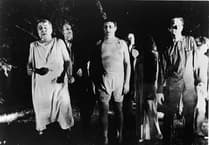MEMORIES of a village factory which firmly stamped its imprint on the world have been recalled by former staff.
A project preserving the legacy of Mitcheldean’s Rank Xerox photocopier plant is now telling the story of the Forest business that exported a technological revolution around the globe.
And former staff and family members
gathered last month at the town hall, where the Xerox archive of equipment and
products is based, to recall the days when more than 4,500 employees produced the world’s leading brand of photocopiers.
The team behind the ‘Memories of Rank Xerox at Mitcheldean’ project are restructuring the town hall archive with a visual timeline dating back to the site’s days as a brewery in the 1860s, and hope to make it more widely open to ex-employees, their children and visitors later this year.
Former Xerox manager Gerald Cooke, who worked at the site from 1960 to 2000, said: “The Mitcheldean business is unique as far as we can make out, in that it published no less than 269 magazines documenting factory life, such as the technology, the products and the people who worked there, such as who’s got married and other social highlights.
“It’s a fantastic social history of the plant and its people, and an amazing record of how a small Forest village was at the centre of a worldwide technological revolution. No other business seems to have such a record, so it’s important to preserve it.”
The factory effectively closed in 2003, when some of the equipment was transferred to the town hall, to be dusted off occasionally for display at heritage weekends.
But some former managers who met regularly decided more should be done to preserve the memories, or its legacy would be lost.
“We set up a Facebook appeal for Xerox plant magazines and now have nearly three complete sets for archives, with another on the way,” said Gerald.
“And bearing in mind that people from Mitcheldean now work as far away as Malaysia, Hong Kong, the US and China, we set up a Facebook group reaching out to people around the world, not just the local area, and to date have more than 1,000 members.
“Next was a website, ‘Memories of Rank Xerox at Mitcheldean’, with all the magazines on it, and photos, and other information, and now we’re working hard on making the museum archive at the town hall more accessible, so people who worked there, family members, villagers and visitors can visit and recall or learn the story.
“With the tremendous help of Mitcheldean Parish Council, who own the hall, we’re currently restructuring the museum, creating a visual timeline with pictures covering the original brewery buildings from 1868 to the end of Xerox’s time here.”
A heritage weekend last September attracted more than 150 people and there was a healthy turn out at the open afternoon recently, including the family of the factory’s former chief executive Fred Wickstead.
“Fred very much drove the expansion of the business, so it was great to see his children Sue and Malcolm and granddaughter Ally with photos and photo albums - they loved it and we hope they can get more involved in our group,” added Gerald
“One of the things we’re trying to do is interview people about their memories for the website, so it would be great to tap into the memories of Fred’s family.
“He was there from 1948 when the plant made cinema equipment employing about 250 people, and oversaw the arrival of Xerox in 1961, and the expansion that saw thousands working there in its heyday.”
Also attending were John Lewer and Jo Beavan, old friends from the plant who had both been recently widowed. Forty years on from working at Xerox, John messaged Jo through the Facebook group. He was surprised to receive a reply from South America, where she was on a cruise, but “the rest is history” and they are now a couple.
“It was great to see people come in, and greet old friends with: ‘I haven’t seen you for 30 years,’ and start chatting about the old times and workmates, and what they’ve been doing with their lives, to preserve and foster that link,” said Gerald.
“And the two old friends who are now a couple after having their own families, that was lovely to see.”
When Rank Xerox was looking for a centre to make the “funny” copier machines, they found a ready-made plant with a skilled workforce that had been making cinema equipment, he added.
“It’s incredible to think that this Forest site became such a huge part of so many lives. It played a massive role in the region, and turned it into an industrial powerhouse exporting cutting edge technology to the world.”
Project teamate
Keith Wilding added: “The open afternoon was really successful, we had more than 40 people looking at the displays at one time, which not only includes machines, but more human mementos, like signs, security badges, product launch memorabilia, personal effects.
“But what really stood out for me was the people remaking personal contact after many years, people spotting faces they knew and shaking hands and reminiscing.
“The impact of Xerox locally was huge, and one of my proudest memories as head of new products was being able to source 50 per cent of our materials locally, such as pallets, packaging, etc. The knock on for the region was immense.
“We were groups of families in each department and lifelong friendships were made. I was there for 27 years and it was a life-changer – I bless the time I worked there.”
There will be another open afternoon at the town hall on Tuesday, February 13, and the team is aiming to have the equipment displays on the same floor as the visual timeline soon and to open more regularly.
“The response has been incredible, and not just locally,” added Gerald. “Visitors have come in and said ‘what an incredible story in a small village, how did this happen?’
“Mitcheldean was a major part of a worldwide technological revolution, and it’s a story worth telling.”
---------
AT the height of photocopier production in the 1960s and 70s, the 70-acre Rank Xerox site was filled with a workforce the size of a town.
Based on the site of the old Wintles brewery dating back to 1868, British Acoustic Films (BAF) moved to Mitcheldean from London in 1940 to escape the Blitz, where they made Bell and Howell cine cameras, plus searchlight equipment and gunfire direction tables.
After the war, parent company the Rank Organisation began manufacturing cinema equipment there in 1948, including the development of sound recording and reproduction equipment, and silent cameras and projectors.
When US company Rank Xerox started producing the Xerox 914 – the first plain paper photocopier – it chose Mitcheldean and its highly skilled workforce to cover Europe and the rest of the world, and business exploded.
In less than a decade, the small village of a few hundred people became home to an industrial complex employing thousands, boosting shops, businesses, pubs, hotels and companies that supplied components.
But the loss of 1,300 jobs in October 2001, when production was transferred to the Czech Republic, heralded the end of an era, with just 80 staff remaining on site until 2010 when all work moved to the US.
The ‘Memories of Rank Xerox at Mitcheldean’ team – Gerald Cooke, Ian Hale, Stuart Harrold and Keith Wilding – are now enhancing the museum, with a visual timeline covering the history of the site.
And it is hoped that major changes to Mitcheldean Town Hall in 2018 will improve accessibility to the collection, begun in 2003, which includes photos, interviews, stories, original Xerox products and memorabilia.
You can follow the team on Facebook at ‘Memories of Rank Xerox at Mitcheldean’ or via memoriesofrxmp.info
You can also email info@memories
ofrxmp.info or write to Memories, North Cottage, Monmouth Road, Longhope, GL17 0QF.




